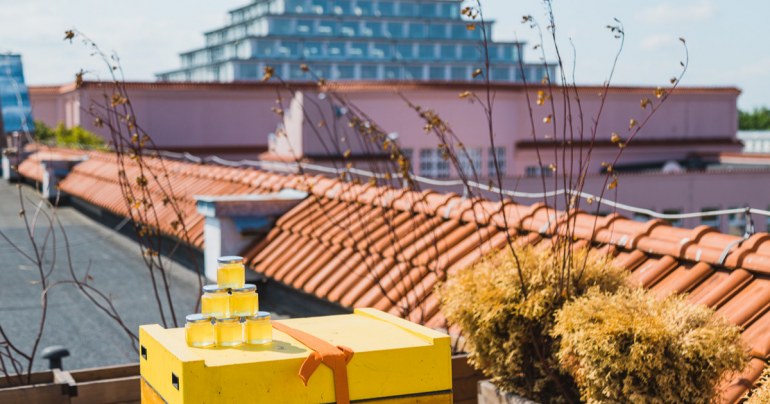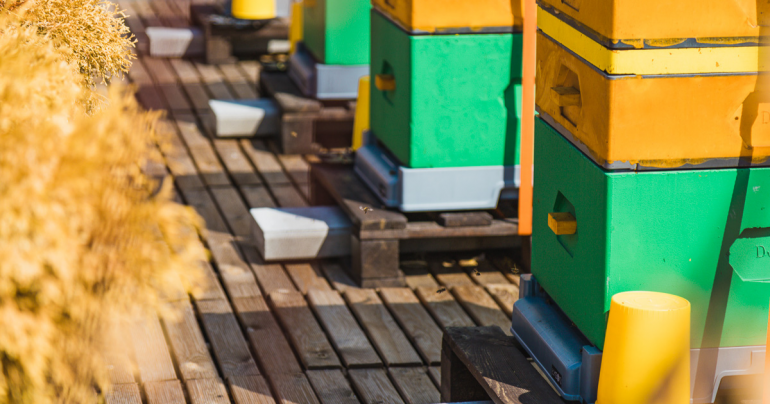
When the majority of students enjoyed their long-awaited holidays after a laborious summer session, new tenants, equally busy, not at all less agile moved into SGH. Due to Joanna and Mariusz Korpus, cooperating with the university authorities, five beehives with householders were placed on the roof of the main library.
Mariusz Korpus, a banker with 15 years of experience, was infected with a passion for beekeeping by his neighbour. Dr. Joanna Korpus, employed at SGH Warsaw School of Economics, recalls that her husband decided to help a neighbour transport the apiary to orchards. He was delighted! At first, Dr. Korpus did not share her husband's enthusiasm, but when he returned the next day with a wonderful fresh honeycomb, they unanimously stated that working with bees would be a perfect escape from everyday life for them.
Taking into account his wife's scientific career and his own university work, Mr. Mariusz decided to enrich the advice of an experienced neighbour-mentor with scientific knowledge. He enrolled in a beekeeping course at Warsaw University of Life Sciences –SGGW (WULS-SGGW), and after completing it for another one, this time at the Botanical Garden of the Jagiellonian University in Krakow. He tries to combine theoretical knowledge with practice. ‘Each bee family is different, one cannot operate under a scheme’ he says. – One has to observe and react. However, to do so vast knowledge is required.
At the beginning of this year, as part of the participatory budget of SGH Warsaw School of Economics, a proposal was made to establish an apiary on the roof of one of the university's buildings - says Dr. Joanna Korpus. - Eventually, the apiary was not included into projects planned for implementation, but the result of voting confirmed the employees' high interest in the indicated initiative. I talked to the university authorities on this topic and so, from word to word, the proposal to extend SGH protection to the bees was born.
It will not be the first such initiative in Warsaw. The ‘beehived’ roofs of the capital include those at the Regent Hotel (until recently the Hyatt Hotel), the Palace of Culture and Science or the Sejm of the Republic of Poland. What do we owe this bee boom to?
In 2015, the City Council of the Capital City of Warsaw, in which it treated bees exceptionally specifying the requirements for their keeping in areas excluded from agricultural production, i.e., among others, in the city. From this date bee families can be kept in our city - Mariusz Korpus explains - keeping a minimum distance of 10 m of hive location from the border of buildings and roads, or windows in the case of hives placed on the roofs of buildings. It is a significant facilitation for such enthusiasts as our pair of guardians.
So is this bee really an ‘SHG bee’? - We agreed that we deal with apiary, while the SGH uses this project for its PR and event purposes - says Mr. Mariusz.

The first lucky ones who had an opportunity to taste the fruit of the new tenants’ work were the participants of the September meeting of SGH Senate. Honey, handed out in neatly decorated jars, did not reveal any links with the university at first, but more perceptive participants noticed the subtle marketing procedure used on the labels: the inscription ‘Pszczoła główna handlowa (SGH bee). Dr Joanna Korpus believes that the name invented by the chancellor is a bull's-eye hit.
How many new colleagues can students returning from their holidays expect? A large beehive houses one family, consisting of one mother, i.e. a queen, and tens of thousands of workers and several thousand drones. Throughout their short life, lasting on average about 40 days, bee workers are engaged in the community work but contrary to appearances, their task is not only the production of honey. At the beginning young bees clean the cells of the patch and the entire hive. Their next duty is to take care of the offspring. Some worker bees who have the ability to produce royal jelly feed the queen. They are also the queen's personal entourage. Additionally, an important task of bee workers is the production of wax and the construction of patches. All worker bees have the task of delivering food to the hive that is nectar and pollen. At the final stage of their lives, bee workers develop a venom gland. It is then that they can become guards protecting their hive against intruders.
Each bee family is a perfectly organised organism that can survive only thanks to cooperation. A single bee, outside the family, has no chance to do it.
One bee brings a teaspoon of honey throughout its life - says Mariusz Korpus. Let's appreciate the hard work of these amazing insects the next time we reach for their sweet treat. Who knows, maybe one of these small portions of honey is the work of life of some ... SGH bee?




